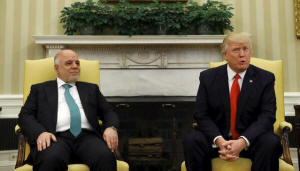|
Iraq's Abadi says he wins Trump's
assurances of more U.S. support
 Send a link to a friend
Send a link to a friend
 [March 21, 2017]
By Phil Stewart and Steve Holland [March 21, 2017]
By Phil Stewart and Steve Holland
WASHINGTON (Reuters) - Iraqi Prime Minister
Haider al-Abadi said he won assurances of greater U.S. support in
fighting Islamic State militants in talks on Monday with President
Donald Trump and top advisers, but cautioned that military might alone
would not be sufficient.
Abadi's remarks followed his first face-to-face meeting at the White
House with Trump, who took office on Jan. 20 pledging a new strategy to
defeat the hardline militant group that seized large swaths of Iraq and
Syria in 2014.
Even before Trump took office, Iraqi forces recaptured a string of major
cities from Islamic State, shrank the militant group's finances and
significantly stemmed the flow of foreign fighters, all with the support
of U.S.-led coalition air strikes and military advisers.
Abadi said Trump appeared more enthusiastic about battling Islamist
extremists than Barack Obama's administration had been.
"I think they're prepared to do more to fight terrorism and be more
engaged," Abadi told a forum in Washington hours after his meeting with
Trump, adding he had been told U.S. "support will not only continue but
will accelerate."
"But of course we have to be careful here," Abadi said. "We are not
talking about military confrontation as such. Committing troops is one
thing, while fighting terrorism is another thing."
Abadi, who leads the Shi'ite majority government in Baghdad, said it
would be crucial to win over the local population in Sunni-dominated
Mosul to achieve lasting peace.

A White House statement about the meeting said both Trump and Abadi
agreed that "terrorism cannot be defeated by military might alone," and
the two leaders called for deepening commercial ties, including in the
energy sector.
At the forum, Abadi called for more financial contributions from the
international community.
"We (would) love to see more funds so that we can quickly (regain)
prosperity and stabilization in these areas," he said.
TOUGH JOB
Abadi spoke as Iraqi forces made steady progress in seizing back Mosul,
Iraq's second largest city, from Islamic State, which officials expect
will become a more classic insurgency once it loses its last major
strongholds.
In a sign of the threat, a car bomb killed at least 23 people and
wounded more than 45 in a mainly Shi'ite southern district, police and
medical sources said.
There was no claim of responsibility, but Islamic State has carried out
similar attacks in Baghdad and other cities as its hold on Mosul
weakens.
Earlier in the day, as the two men met, Trump told Abadi that he knew
his forces were fighting hard.
[to top of second column] |

President Donald Trump meets with Iraqi Prime Minister Haider
al-Abadi at the White House in Washington, U.S., March 20, 2017.
REUTERS/Kevin Lamarque

"It's not an easy job," Trump said. "It's a very tough job. Your
soldiers are fighting hard. I know Mosul is moving along. ... We
will figure something out.
"Our main thrust is we have to get rid of ISIS. We're going to get
rid of ISIS. It will happen. It's happening right now," Trump added,
using an acronym for Islamic State.
Asked whether he had seen the Trump administration's plan to wipe
out Islamic State, Abadi said: "I haven't seen a full plan. I know
there is a plan. I haven't seen it."
Abadi is in Washington this week ahead of a gathering of world
leaders of a coalition fighting Islamic State.
In many ways, his visit comes at a high point for him after
successfully appealing to Trump to remove Iraq from a list of
countries included in a revamped travel ban.
Trump decided this month's revised order temporarily banning the
entry of travelers from several Muslim-majority nations would not
include Iraq because of its cooperation with the United States. Both
the initial Jan. 27 travel ban and the revised version have been
blocked by federal courts.
Detractors argue the ban discriminated against Muslims in violation
of the U.S. Constitution's guarantee of religious freedom. Trump
says the measure is necessary for national security to protect the
country from terrorist attacks.
"I thank you for removing Iraq from the presidential order ... this
was a positive response to the Iraqi request that betters the
relationship with Iraq and the value of Iraq as far as
Iraqi-American relations," Abadi told Trump.
(Additional reporting by Yara Bayoumy and Eric Beech in Washington
and Patrick Markey and John Davison in Iraq; Writing by Phil
Stewart; Editing by Peter Cooney and Richard Pullin)
[© 2017 Thomson Reuters. All rights
reserved.]
Copyright 2017 Reuters. All rights reserved. This material may not be published,
broadcast, rewritten or redistributed.

 |